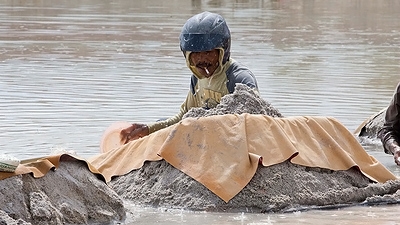Challenge
Close to 3.5 billion people live in countries rich in oil, gas, and minerals. However, historically, several resource-rich developing countries have shown below-average growth performance and their citizens live in persistent poverty due to a lack of transparency and corruption caused by weak governance, the so called “Paradox of Plenty.”
The Extractive Industries Transparency Initiative (EITI), launched in 2003, promotes and supports improved governance and transparency in resource-rich countries through the full publication and audit of company payments and government revenues from oil, gas, and mining. As a voluntary commitment of stakeholders with shared goals, the global EITI structure comprises resource-rich countries, international and national extractive companies, civil society, investors, and supporting countries. The World Bank-administered Multi-Donor Trust Fund (MDTF) provides countries with resources to implement the EITI principles of revenue transparency. The initiative has grown rapidly over the last few years and, going forward, sustaining the progress and momentum achieved will be crucial.
Solution
The EITI was launched with two main objectives: to disclose and reconcile extractive industries revenues paid to and received by governments (taxes, royalties, and signature bonuses), and to promote and strengthen the multi-stakeholder dialogue approach. Each participating country must issue a reconciliation report covering revenues for the most recent fiscal years prepared by an independent auditor. EITI implementing countries must go through a validation process to evaluate implementation in consultation with all stakeholders by reviewing achievements, and identifying opportunities to strengthen the process. The successful validation will lead to a country achieving "EITI compliant" status. In World Bank client countries, EITI implementation is in line with the governance and anti-corruption agenda advanced through the support to institutions managing the extractives sector and to civil society groups that monitor the sector.
Results
Progress has been made toward EITI compliance in several countries: 14International Development Association (IDA) countries, 4 International Bank for Reconstruction and Development (IBRD) countries, and 1 Organization for Economic Cooperation and Development (OECD) country have become compliant, while 12 IDA and 6 IBRD countries are on their way. In addition, 12 IDA, 16 IBRD countries and the United States are at different stages of consultation to sign on to the initiative.
EITI reports have helped uncover financial irregularities and have provided a roadmap for reforms of the oil, gas and mining sectors, which are often the largest generator of foreign exchange and government revenues. EITI implementation has set the stage for wider sector reforms, such as public financial management or institutional reforms such as the strengthening of government institutions that regulate the sector. The active participation of civil society organizations (CSOs) is also one of the main EITI criteria and a condition for the success of the standard to ensure a real tripartite dialogue despite the capacity constraints that many CSOs face. The World Bank, together with other donors, has stepped in to support capacity building of civil society groups to increase their effectiveness in advancing transparency and accountability. Civil society groups must be enabled to review and assess EITI reports, fiscal regimes, and compliance with national laws by government agencies and extractive companies.


